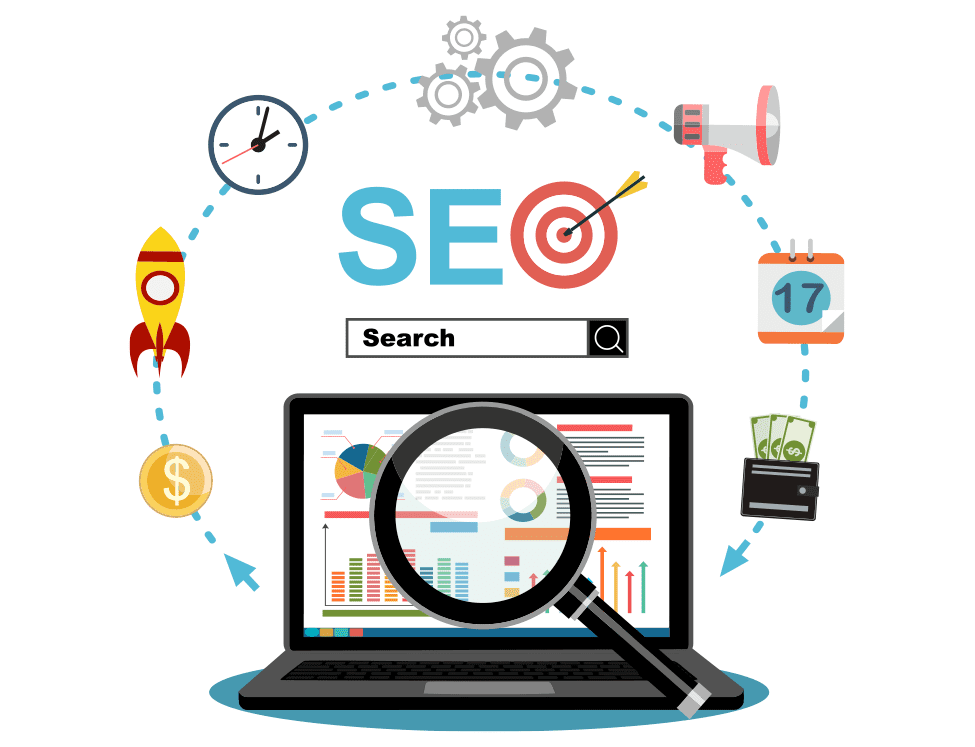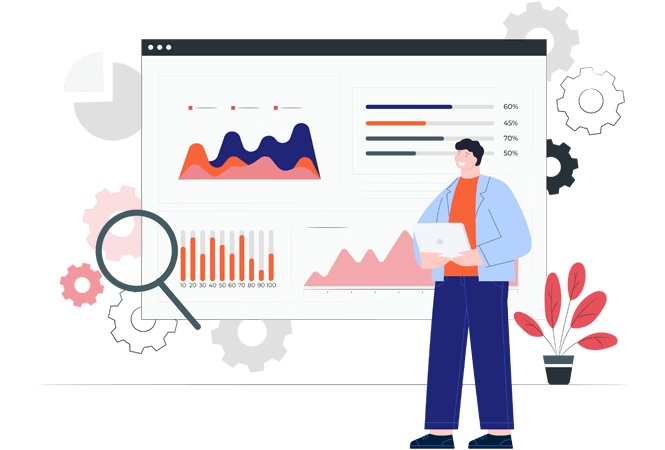Digital marketing services
Partnering with us for your digital marketing needs ensures a data-driven approach, high-quality SEO, effective PPC advertising, compelling social media presence, engaging content marketing, and accurate analytics and reporting. Contact us today to take your digital marketing to the next level!

Data-Driven Approach
Our digital marketing strategies are built on a foundation of data analysis, market research, and customer insights. We use this information to develop customized solutions that align with your business objectives.
Search Engine Optimization (SEO)
We understand that ranking high on search engine results pages (SERPs) is essential for driving traffic and leads to your website. Our SEO services include keyword research, on-page optimization, link building, and content creation to help your website rank higher and reach your target audience.
Pay-Per-Click (PPC) Advertising
Our PPC campaigns are designed to drive targeted traffic to your website by placing ads on search engines, social media platforms, and other relevant websites. We use advanced targeting options and ad copy optimization to increase click-through rates and conversion rates.
Social Media Marketing
We help you build a strong social media presence by developing a social media marketing strategy that aligns with your business goals. We create compelling content, manage your social media accounts, and engage with your followers to increase brand awareness and drive conversions.
Content Marketing
We create and distribute high-quality content that engages and educates your target audience. From blog posts and infographics to videos and e-books, our content marketing services help you establish thought leadership, increase website traffic, and generate leads.
Analytics and Reporting
We provide detailed analytics and reporting to help you measure the effectiveness of your digital marketing campaigns. We track key performance indicators (KPIs) such as website traffic, lead generation, and conversion rates, and provide regular reports that show your progress and areas for improvement.
More details about our Digital marketing services:

Data-Driven Approach
- Informed decisions based on relevant data insights
- Increased efficiency while minimizing unnecessary expenditures
- Improved ROI by leveraging data to inform your marketing and business choices
Search Engine Optimization
- On-Page Optimization
- Keyword Research
- Link Building
- Technical SEO


Pay-Per-Click Advertising
- Highly Targeted Advertising
- Cost-Effective Advertising
- Quick and Measurable Results
- Increased Brand Awareness
Social Media Marketing
- Social Media Strategy
- Community Management
- Advertising Campaigns
- Influencer Partnerships


Content Marketing
- Content Strategy
- Content Creation
- Content Distribution
- Content Optimization
Analytics and Reporting
- Performance tracking
- Data analysis
- Custom reporting
- Campaign optimization
- ROI tracking
- Data visualization
Why Choose Us:
Proven Track Record
We have a long and successful history of helping businesses grow through effective digital marketing strategies. Our team has years of experience in the field, and we have a track record of delivering results for our clients.
Customized Strategies
We understand that every business is unique, which is why we take the time to develop customized digital marketing strategies for each of our clients. We work closely with you to understand your goals, target audience, and industry, so we can create a strategy that is tailored to your specific needs.
Innovative Solutions
Our team is always on the cutting edge of digital marketing trends and technologies. We use the latest tools and techniques to ensure that our clients stay ahead of the competition and achieve their goals.
Transparent Reporting
We believe in transparency and accountability. That's why we provide detailed reports on our digital marketing efforts, so you can see exactly how your campaigns are performing and the results they are generating.
Measurable ROI
At the end of the day, our goal is to help our clients achieve a measurable return on investment. We use a range of metrics and analytics to track the success of our campaigns, so you can see the impact they are having on your bottom line.
Cost-Effective
We offer cost-effective B2B lead generation solutions that fit your budget. Our customized solutions help you get the most out of your marketing spend and maximize your ROI.
FAQ
The basics of Digital Marketing
Digital marketing is the practice of promoting products or services using digital channels such as search engines, social media, email, mobile apps, and websites. It involves various digital tactics and techniques to reach a target audience and convert them into customers. Digital marketing encompasses a range of activities including content creation, search engine optimization, pay-per-click advertising, email marketing, social media marketing, and more. The goal of digital marketing is to increase brand awareness, generate leads, and drive sales by engaging with potential customers online.
Learning digital marketing can be done in several ways, including:
Online courses: There are many online courses available that teach digital marketing skills, from beginner to advanced levels. These courses are offered by various platforms, including Google, Hubspot, Udemy, and Coursera.
Blogs and podcasts: There are many digital marketing blogs and podcasts available that provide valuable insights and tips on various digital marketing topics. Some popular blogs include Moz, Neil Patel, and Search Engine Journal, while popular podcasts include DigitalMarketer, Social Media Examiner, and The Social Media Marketing Podcast.
Networking and mentorship: Joining digital marketing groups and attending networking events can help you connect with other professionals in the industry and learn from their experiences. Finding a mentor in the digital marketing field can also provide you with valuable guidance and knowledge.
Hands-on experience: One of the best ways to learn digital marketing is through hands-on experience. You can gain experience by volunteering for digital marketing projects, working as an intern or apprentice, or starting your own digital marketing project.
Books: There are many books available on digital marketing that provide comprehensive knowledge on various topics such as SEO, PPC, social media, and content marketing. Some popular books include “The Art of SEO” by Eric Enge, “Epic Content Marketing” by Joe Pulizzi, and “The Ultimate Guide to Pay-Per-Click Advertising” by Richard Stokes.
Certifications: Earning certifications in digital marketing can help you validate your skills and knowledge in the field. Some popular certifications include Google Ads Certification, Hubspot Inbound Marketing Certification, and Facebook Blueprint Certification.
Having a budget helps you avoid the traps of digital marketing by providing a clear understanding of the financial limitations and opportunities for your marketing efforts. Without a budget, it’s easy to overspend or underspend on marketing, which can lead to ineffective campaigns, missed opportunities, and wasted resources.
By having a clear budget, you can focus your efforts on the channels and strategies that provide the most value and ROI for your business. Otherwise you risk spreading yourself too thin across multiple channels or investing too heavily in channels that aren’t delivering results.
A budget also helps you prioritize your marketing efforts based on your business goals and objectives. For example, if your goal is to drive more traffic to your website, you may allocate more of your budget to SEO or PPC advertising. On the other hand, if your goal is to increase brand awareness, you may focus more on social media or content marketing.
Finally, having a budget can help you measure the success of your marketing efforts and make data-driven decisions. By tracking your expenses and revenue, you can analyze the ROI of each marketing campaign and adjust your strategy accordingly. This can help you avoid the trap of blindly following trends or sticking to strategies that no longer work for your business.
The digital marketing strategy that tracks users across the web is called remarketing or retargeting. It involves showing ads to people who have previously interacted with a brand’s website or content, even after they have left that website and visited other sites on the internet. This is done by using cookies to track the user’s browsing behavior and then showing them relevant ads based on their past interactions. The aim of remarketing is to re-engage potential customers and encourage them to return to a brand’s website and complete a desired action, such as making a purchase or filling out a form.
Digital marketing is important for several reasons:
Targeted audience: Digital marketing allows businesses to reach their target audience through various channels, such as social media, search engines, email, and more. This helps to ensure that the message is reaching the right people, which can increase the effectiveness of the marketing efforts.
Cost-effective: Digital marketing can be much more cost-effective than traditional marketing methods. For example, advertising on social media or search engines can be less expensive than advertising on TV or radio.
Measurable results: Digital marketing provides measurable results, which means that businesses can track the effectiveness of their marketing efforts and make adjustments as needed. This allows for more accurate and efficient use of resources.
Increased visibility: With the rise of online shopping and research, having a strong digital presence can increase a business’s visibility and make it easier for potential customers to find them.
Brand building: Digital marketing can be an effective tool for building brand awareness and loyalty. By consistently sharing valuable content and engaging with customers on social media, businesses can strengthen their brand and build trust with their audience.
Flexibility: Digital marketing offers flexibility in terms of content, audience, and timing. Businesses can tailor their message to different audiences, test different strategies, and make adjustments on the fly. This allows for a more nimble and responsive approach to marketing.
Examples of digital marketing include:
Search Engine Optimization (SEO): optimizing your website and content to rank higher in search engine results pages (SERPs) to attract more organic traffic.
Pay-Per-Click (PPC) Advertising: placing targeted ads on search engines or social media platforms that are only charged when someone clicks on the ad.
Social Media Marketing: promoting products or services on social media platforms such as Facebook, Instagram, Twitter, and LinkedIn.
Content Marketing: creating valuable and relevant content to attract and engage potential customers, such as blog posts, infographics, videos, and podcasts.
Email Marketing: using email campaigns to promote products or services to existing and potential customers.
Mobile Marketing: optimizing digital marketing campaigns for mobile devices such as smartphones and tablets, using mobile apps or mobile-friendly websites.
These are just a few examples of the many digital marketing strategies that businesses can use to reach their target audience and achieve their marketing goals.
A digital marketing manager is responsible for developing, implementing, and managing the overall digital marketing strategy for a business or organization. Their main objective is to increase brand awareness, drive traffic to the company’s website or social media channels, and ultimately convert leads into customers.
Here are some of the key tasks a digital marketing manager may be responsible for:
Developing and executing digital marketing campaigns across various channels such as email, social media, search engines, and display advertising.
Analyzing website and social media analytics to measure the success of campaigns and adjust strategies accordingly.
Managing and optimizing the company’s website to improve search engine rankings and user experience.
Creating and curating content for social media platforms, blogs, and email campaigns.
Collaborating with other teams such as graphic designers, copywriters, and web developers to create cohesive digital marketing campaigns.
Staying up-to-date with the latest digital marketing trends and technologies and providing recommendations for improvement to senior management.
Here are the main reasons why experience is important in digital marketing agencies:
Understanding of the Industry: Experienced professionals in digital marketing agencies have a deep understanding of the industry, its history, trends, and future directions. This knowledge allows them to make informed decisions about marketing strategies that are effective for their clients.
Knowledge of Tools and Platforms: Digital marketing involves a lot of tools and platforms, such as Google Ads, Facebook Ads, SEO tools, and more. Experienced professionals have worked with these tools and platforms for years and are familiar with their features, functionality, and best practices.
Ability to Adapt: The digital marketing industry is constantly changing, and new technologies and techniques are being developed all the time. Experienced professionals have the ability to adapt to these changes and adjust their strategies accordingly.
Strategic Thinking: Experienced digital marketers have a strategic mindset and can develop and execute effective marketing campaigns that align with their clients’ business objectives.
Results-Oriented: Experienced digital marketers focus on results and are able to measure the success of their campaigns. They can analyze data, identify trends, and make data-driven decisions to improve their clients’ marketing strategies.
In summary, experience is crucial in digital marketing agencies because it provides a deep understanding of the industry, knowledge of tools and platforms, the ability to adapt, strategic thinking, and a results-oriented mindset. These qualities are essential for developing effective marketing campaigns that deliver measurable results for clients.
Ready to Start?
Choose our digital marketing services to help your business grow and succeed in the competitive online marketplace.
